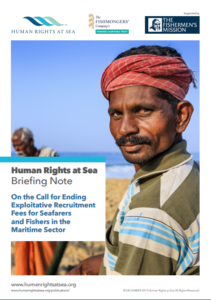Human Rights at Sea published its latest briefing note concerning the exploitative recruitment fees in the maritime industry and further calls for an end to such fees for workers in a call to action.
Namely, Human Rights at Sea note that such “misleading and exploitative recruitment practices by some labor recruiters and overseas employment agencies are a continued blight on raising social welfare and human rights standards in the global maritime sector”.
[smlsubform prepend=”GET THE SAFETY4SEA IN YOUR INBOX!” showname=false emailtxt=”” emailholder=”Enter your email address” showsubmit=true submittxt=”Submit” jsthanks=false thankyou=”Thank you for subscribing to our mailing list”]
Now, HRAS calls for an immediate end to the charging of exploitative recruitment fees and related costs to all workers in the commercial shipping and fishing industries throughout the global maritime sector upholding the Employer Pays Principle.
It can be said that human rights at sea gains significant attention of the maritime community. Due to its diversified identity, shipping constitutes a friendly field for human rights abuses, with human trafficking, illegal migration, slavery and abuse in fishing sector and even the unsafe working conditions in many Southeast Asian ship recycling facilities being among the key areas of concern.
5 common human rights abuses in maritime include:
- Forced labor and slavery: This occurs when a person is trafficked into a crew position without any contractual agreement to protect his/her rights. For example, for years, the Thai fishing industry, engaging about 71,000 migrant workers on board fishing vessels, has been criticized for systematic human rights abuses, despite several years of highly-publicized efforts.
- Excessive working hours and low wages: The nature of seafaring as a job unfortunately permits overtime, as seafarers do not ‘leave at the end of the working day’. It is also easy for crews to fall victim of exploitation if they are coming from countries affected by conflict or poverty and have no alternative options. Recently, RMI informed of increased PSC deficiencies caused by cadets’ excessive working hours. Meanwhile, according to ITF, sometimes the so-called ‘flags of convenience’ allow owners to bypass the better minimum wage and working conditions that are common in the countries from where they do business.
- Bullying or harassment: Bullying and harassment, including sexual harassment, is an abuse of human rights and living on a ship offers limited alternative to avoid it. This aspect of abuse is particularly important for women, as it is considered one of the reasons that women hesitate to pursue a shipping career.
- Abandonment: Abandonment may occur due to financial difficulties of shipowners or even because they can make more money by not paying wages. This can result in seafarers being abandoned in ports far from home without fuel, food and water and without pay for months on end.
- Piracy: In all high-risk areas, seafarers are exposed to mental and physical abuse by pirates, while they might also encounter prolonged captivity which obviously violates their fundamental right to freedom.
Specifically, according to evidence gathered by HRAS, workers- and migrant workers in particular- are almost always made to pay for the opportunity of work either directly or indirectly by dishonest third-party facilitators operating under the banner of charging ‘standard service costs’ which in reality are often unreasonable, and often unlawful.
To add to this, fees charged are “invariably excessive and underpin an exploitative service industry often bringing life-long debt to workers, their dependents and extended families in the form of debt-bondage”. What is more, there seems to be a lack of transparency throughout this human supply chain.
Human Rights at Sea advise that workers should never incur debt-bondage to maintain maritime supply chains when such fees are essential business costs that should be accepted and absorbed by employers as part of any lawful and morally upright business model. Recruitment fees and related costs should, in the first instance, be borne by the employers and later shared by the buyers of their respective services and products.
Human Rights at Sea highlight that
Such abusive and exploitative practices must therefore be continuously publicly challenged and ultimately curtailed, if not stopped throughout the global maritime sector.
It is noted that this is the basis for voluntary guidance such as the Institute of Human Rights at Business (IHRB) ‘Employer Pays Principle’ reflecting Principle 1 of the IHRB Dhaka Principles for Migration with Dignity.
The Employer Pays Principle is a commitment to ensure that no worker should pay for a job. In the meantime, for an employer such costs will invariably fall as essential business disbursement costs which should be lawfully offset against commercial business tax.
To explore more about the briefing note, you can click on the PDF bellow.
































































